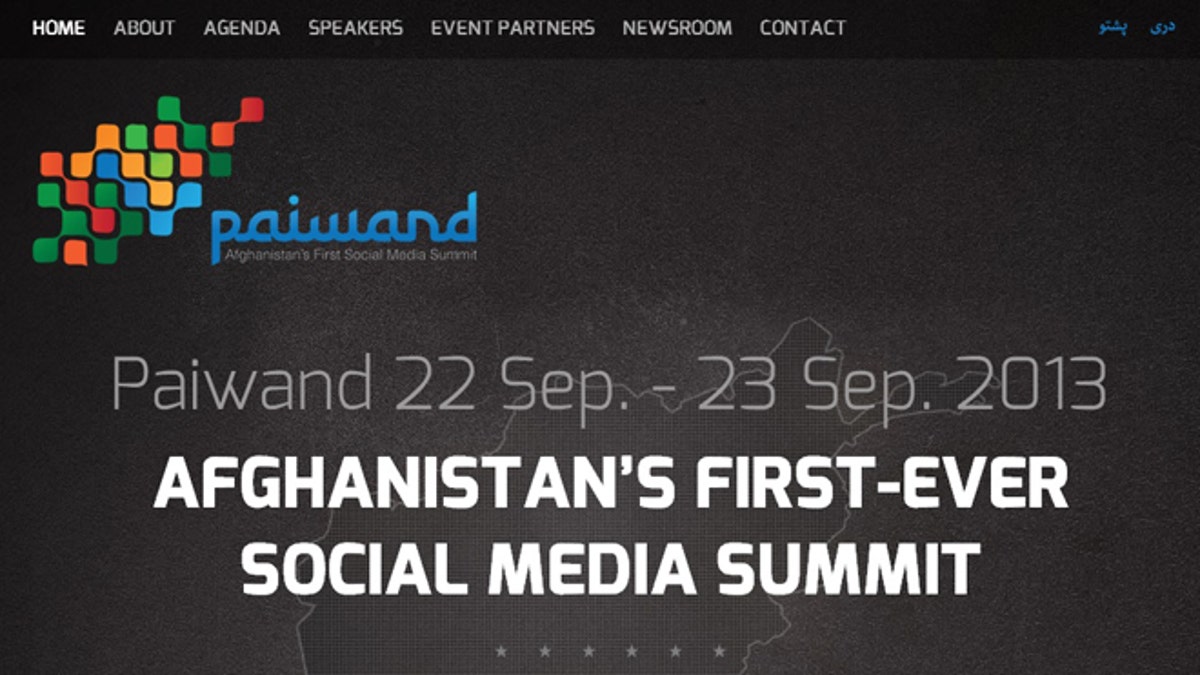
A screenshot of the website for Paiwand, Afghanistan's first ever social media summit. (Paiwand / FoxNews.com)
Imagine living in a country where only 3.5 percent of the population use the Internet. When you ask a neighbor about Facebook, they give you a confused look. Posting a status update on Twitter is a foreign concept, and most citizens still rely on printed newspapers and radio reports.
That’s life in Afghanistan today, where only 1.5 million people (out of 30M) have Internet access.
A new National Social Media Summit intends to change that trend. To be held September 22 to 23 in Kabul, and featuring some 200 speakers, the event will promote the use of social media as a way to not only discuss current news, but to make news.
“When the Taliban were ousted in 2001, you had to travel to Pakistan to make an international call,” Eileen Guo, the event director, told FoxNews.com. “Internet penetration … has increased significantly since the introduction of affordable 3G, and estimates of mobile coverage vary from around 80 percent to 95 percent of the country.”
'Internet connectivity is still considered a special privilege only for a special few.'
Guo says, in addition to the limited DSL and 3G connections, many Afghans also connect at Internet cafes. And social media has a presence in the country in another way: Those who are connected sometimes relay Facebook and Twitter information verbally to those who are not connected.
- Secure alternatives to Facebook, Instagram and Twitter
- ‘Watch this:’ How ultraviolent video games and ultraviolent films differ
- Iran mulls Persian cat as next animal astronaut
- ‘Frag him’: Video games ratchet up violence, blur line between fantasy and reality
- ‘Training simulation:’ Mass killers often share obsession with violent video games
- Sony invents QX Wi-Fi cameras for better quality photos on mobile devices
- Has ‘Grand Theft Auto V’ grown up?
The summit, called Paiwand (or Connection), aims to boost Net use further. It will break out into several themes including social media and government transparency, new media trends and emerging tech.
Scheduled speakers include Aimal Marjan, the Deputy Director of IT at the Ministry of Communications and Information Technology as well as noted journalists such as Massoud Hossaini (who won the Pulitzer Prize for his photography in Afghanistan) and Matthieu Aikins, the Canadian reporter based in Kabul who has covered the rise of social media.
Javid Hamdard, an IT expert working on Afghanistan, says Internet usage will continue to rise and that will spur more social media activity. Today, there’s a renewed emphasis on installing DSL routers to access the Internet and deploy more mobile 3G data networks.
“Internet connectivity is still considered a special privilege only for a special few,” Hamdard told FoxNews.com. “With limited production and availability of local tools and applications at the moment, social media is still used in Afghanistan in its traditional nascent fashion for basic communications, networking, sharing, access to news and information and entertainment.”
Both Hamdard and Guo said social media in Afghanistan is not intended as a replacement for traditional media but will augment the news and allow more open discussion.
Guo says social media can help correct the ills of Afghan society, citing the case of a police officer who was beaten up at the request of the Chief of Staff of the Army's son.
“Incredibly, a video of this was recorded on a mobile phone and uploaded onto Facebook, where it quickly went viral, prompting the traditional media to take note, interview the police officer involved, and forcing a response from the Office of the Chief of Staff of the Army.”
Of course, as with any emerging technology in a country that is still struggling to adopt modern technology, there are risks involved. David Meizlik, a spokesperson for the social media management tool NexGate, says the rise of social media also makes it a prime target for abuse. Hackers can use social media to sway public opinion and generate distrust.
“In a recovering region with such a diverse set of challenges, as in Afghanistan, it's critical that media organizations that leverage social media have safeguards in place to ensure that they aren't targeted and exploited while protecting their followers who could become targets because of their opinions and/or affiliations,” says Meizlik, speaking to Fox News.
This will mean relying on social media managers that search for keywords and chatter around topics and help organizations in Afghanistan manage the flow of social media.
Still, Hamdard is optimistic about the trend. “Social media is an even wider platform for communication, networking and sharing in Afghanistan,” he says.
Editors' Note: An earlier version of this article contained an incorrect link to Paiwand.com, a website that is unaffiliated with the Paiwand social media summit. The correct website is www.paiwand.af.
